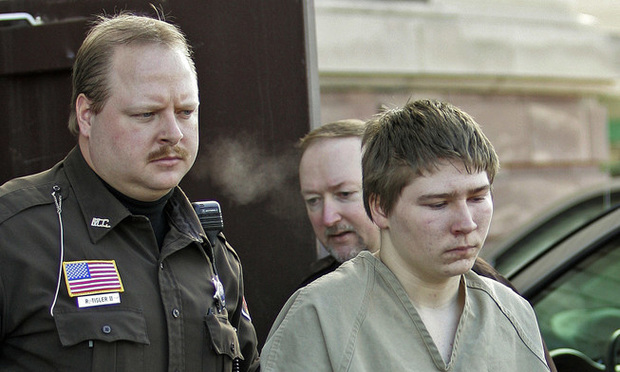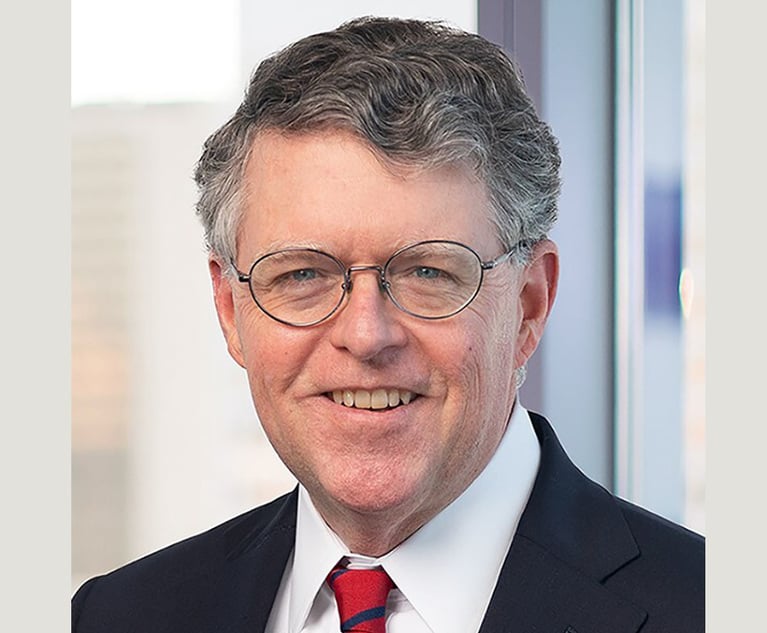SCOTUS Should Enforce Protections for Children During Police Interrogations
For decades, the Supreme Court has protected children from a variety of excesses and abuses in our justice system—but its work is not done.
May 30, 2018 at 04:40 PM
5 minute read
 Brendan Dassey, 16, is escorted out of a Manitowoc County Circuit courtroom March 3, 2006, in Manitowoc, Wisconsin. Photo: Morry Gash/AP
Brendan Dassey, 16, is escorted out of a Manitowoc County Circuit courtroom March 3, 2006, in Manitowoc, Wisconsin. Photo: Morry Gash/AP On June 14, the U.S. Supreme Court is expected to consider whether to take the case of Brendan Dassey—the intellectually impaired Wisconsin teenager who falsely confessed to participating in the 2005 killing of Teresa Halbach. Because Dassey's case raises crucial issues concerning the way impaired children are protected—or not—during police interrogation, the high court should agree to hear his case.
Dassey's story was captured in painstaking—and painful—detail in the Netflix docuseries “Making a Murderer.” Millions watched in horror as interrogators questioned the 16-year old without an adult by his side and fed him a false narrative that he eventually was duped into accepting. Using calculation, prodding and feigned concern for his welfare, a pair of interrogators skillfully persuaded Dassey to admit killing someone for whom there is no evidence he ever even met.
Viewers of the series readily cried “foul” as the mismatch between an intellectually and socially limited boy and his seasoned adult interrogators become glaringly obvious. As a lawyer for children for more than four decades, I could barely resist hurling myself at the virtual travesty unfolding before me. After confessing to the murder, Dassey's primary concern was whether he would still have time to complete a school assignment; his complete lack of understanding of the jeopardy he faced was stunning.
Despite overwhelming popular sentiment that Dassey was coerced into giving a false statement, the state and federal courts have denied him relief. After a federal district court and a panel of appellate judges ruled in his favor, the en banc U.S. Court of Appeals for the Seventh Circuit upheld the constitutionality of his interrogation and confession by a 4-3 vote. Seth Waxman, the former U.S. solicitor general who several years ago successfully argued the case that ended the juvenile death penalty, has now joined Dassey's team in an effort to get the Supreme Court to take Dassey's case.
The high court is literally the last chance for Dassey. If the court does not review and reverse the lower court rulings, Dassey may have to serve out the remainder of his life sentence in a Wisconsin prison. He will not be eligible for parole—which is no guarantee—before 2048, when he will be nearly 60 years of age. But there is much more at stake in this case than Dassey's timely release from his own nightmare. Children who are left to face experienced detectives on their own will continue to populate our prisons with other Dasseys. These vulnerable youth are easily tricked into falsely confessing to murder and other serious crimes because of their inability to comprehend, appreciate or navigate a complicated criminal justice system that regularly trips up even mature adults.
Forty years ago, the Supreme Court held that confessions from juveniles must be evaluated with “special care” to account for adolescents' vulnerability to the psychological tactics of contemporary police interrogation. But in the intervening decades, lower courts have too often ignored this requirement, regularly paying mere lip service—if that—to the ways in which a defendant's youthfulness affected the voluntariness of his confession. This unwillingness to follow long-established Supreme Court precedent is all the more unreasonable in light of recent scientific research confirming the developmental differences between youth and adults, and the Supreme Court's own wholehearted embrace of this research. Since 2005, the court has issued five decisions upending adult sentencing for youth and rewriting the rules for determining when youth are in custody with regard to the administration of Miranda warnings.
Dassey's case is not an anomaly. His is only one among many false confessions by children. Indeed, research shows that children are responsible for a disproportionate number of false confessions nationwide. Research also explains why: children are highly susceptible to the psychologically coercive tactics employed by police today. They are also unskilled and uninformed of the risks they face during the course of an interrogation. While the Miranda rule was intended to give suspects an opportunity to seek the assistance of counsel before speaking with police, these admonitions are often lost on children who lack the intellectual awareness or sophistication to protect themselves. Children with educational disabilities or mental health challenges are even more compromised in these settings.
For decades, the Supreme Court has protected children from a variety of excesses and abuses in our justice system—but its work is not done. Children like Dassey cannot negotiate a closed interrogation room or often even understand the pressures, promises or falsehoods thrown at them by police to extract confessions. After several hours of questioning by police about a murder they believed he participated in, Dassey's only concern was getting back to school. What greater proof does one need that his “confession” was not knowing, intelligent or voluntary? The answer, which only the Supreme Court can provide, is none.
Marsha Levick is deputy director and chief counsel of the Juvenile Law Center. She is counsel of record on an amicus brief in support of petitioner Brendan Dassey submitted by juvenile law experts, including the Juvenile Law Center, in Dassey v. Dittmann.
This content has been archived. It is available through our partners, LexisNexis® and Bloomberg Law.
To view this content, please continue to their sites.
Not a Lexis Subscriber?
Subscribe Now
Not a Bloomberg Law Subscriber?
Subscribe Now
NOT FOR REPRINT
© 2025 ALM Global, LLC, All Rights Reserved. Request academic re-use from www.copyright.com. All other uses, submit a request to [email protected]. For more information visit Asset & Logo Licensing.
You Might Like
View All
Switching Positions: US Solicitors General and Climate Change Lawsuits
6 minute read
Jimmy Carter’s 1974 Law Day Speech: A Call for Lawyers to Do the Public Good
14 minute readTrending Stories
- 1NYSBA Annual Meeting Day One: Gen AI Ethics, Social Media Pitfalls, and More
- 2Latham Lands Top Spot as US Firms Dominate in UK M&A Rankings
- 3Mich. Attorney Faces One-Year Suspension in Ill. for Lying to Firm, Clients
- 4Penn State Dickinson Law Dean Named President-Elect of Association of American Law Schools
- 5A Voyeur Videotaped Them Undressing. Should Cruise Ship Passengers Have to Arbitrate?
Who Got The Work
J. Brugh Lower of Gibbons has entered an appearance for industrial equipment supplier Devco Corporation in a pending trademark infringement lawsuit. The suit, accusing the defendant of selling knock-off Graco products, was filed Dec. 18 in New Jersey District Court by Rivkin Radler on behalf of Graco Inc. and Graco Minnesota. The case, assigned to U.S. District Judge Zahid N. Quraishi, is 3:24-cv-11294, Graco Inc. et al v. Devco Corporation.
Who Got The Work
Rebecca Maller-Stein and Kent A. Yalowitz of Arnold & Porter Kaye Scholer have entered their appearances for Hanaco Venture Capital and its executives, Lior Prosor and David Frankel, in a pending securities lawsuit. The action, filed on Dec. 24 in New York Southern District Court by Zell, Aron & Co. on behalf of Goldeneye Advisors, accuses the defendants of negligently and fraudulently managing the plaintiff's $1 million investment. The case, assigned to U.S. District Judge Vernon S. Broderick, is 1:24-cv-09918, Goldeneye Advisors, LLC v. Hanaco Venture Capital, Ltd. et al.
Who Got The Work
Attorneys from A&O Shearman has stepped in as defense counsel for Toronto-Dominion Bank and other defendants in a pending securities class action. The suit, filed Dec. 11 in New York Southern District Court by Bleichmar Fonti & Auld, accuses the defendants of concealing the bank's 'pervasive' deficiencies in regards to its compliance with the Bank Secrecy Act and the quality of its anti-money laundering controls. The case, assigned to U.S. District Judge Arun Subramanian, is 1:24-cv-09445, Gonzalez v. The Toronto-Dominion Bank et al.
Who Got The Work
Crown Castle International, a Pennsylvania company providing shared communications infrastructure, has turned to Luke D. Wolf of Gordon Rees Scully Mansukhani to fend off a pending breach-of-contract lawsuit. The court action, filed Nov. 25 in Michigan Eastern District Court by Hooper Hathaway PC on behalf of The Town Residences LLC, accuses Crown Castle of failing to transfer approximately $30,000 in utility payments from T-Mobile in breach of a roof-top lease and assignment agreement. The case, assigned to U.S. District Judge Susan K. Declercq, is 2:24-cv-13131, The Town Residences LLC v. T-Mobile US, Inc. et al.
Who Got The Work
Wilfred P. Coronato and Daniel M. Schwartz of McCarter & English have stepped in as defense counsel to Electrolux Home Products Inc. in a pending product liability lawsuit. The court action, filed Nov. 26 in New York Eastern District Court by Poulos Lopiccolo PC and Nagel Rice LLP on behalf of David Stern, alleges that the defendant's refrigerators’ drawers and shelving repeatedly break and fall apart within months after purchase. The case, assigned to U.S. District Judge Joan M. Azrack, is 2:24-cv-08204, Stern v. Electrolux Home Products, Inc.












